Interview: Ei Aoki
by Jacob Chapman,On a bright and sunny Saturday at this year's first annual Akibafest in Little Tokyo, Los Angeles, Ei Aoki sat down for a roundtable interview to discuss his accomplished career as an anime director. Since Aoki has helmed so many projects from Ga-Rei: Zero to Fate/Zero to Aldnoah.Zero (and many other anime without zero in the title), there was a lot to discuss between the three interviewers gathered for this king-sized discussion. (Each question and comment bolded below will be credited by the interviewer's first name: ANN's own Jacob Chapman, William Hong of ConFreaks and Geeks, and Jasmine Abdulla of That Hashtag Show.)
Jacob: Studio ufotable has a very post-production-heavy approach to their shows. There's a lot of digital effects put in after the fact, so what is it like working as a director when there's so much left to the imagination during production? Is it different from other projects you've done?
Ei Aoki: There is a director of photography at ufotable by the name of Terao. He has worked on many ufotable titles, and I think his style has very much become the signature style of the studio today. I tend to prefer clear-cut visuals for myself, like in J.J. Abrams and Zac Snyder films. Those are the styles I tend to prefer, very "cool" and clear with a hint of coldness, that's the imagery that I tell the director of photography to follow.
Jacob: Post-apocalyptic aesthetic, would you say?
Yes, I would say so. The worldview of the show is the most important, but my own preference tends to go that way as well.
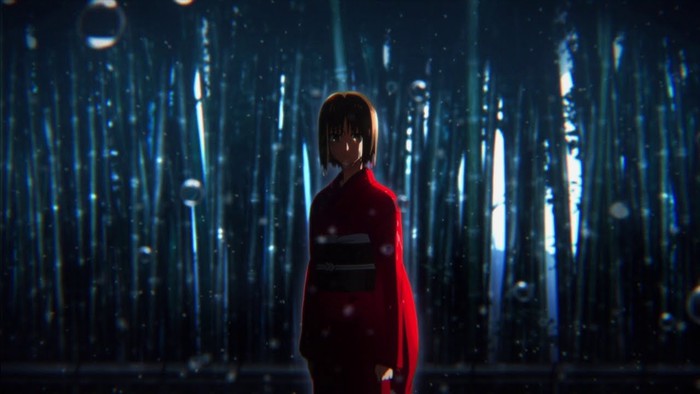
Jasmine: What inspired you to get into animation, and are there any works you watched as a kid or as an adult that really motivated you and became your favorites?
That's always a stumper, but I've always loved animation, and a lot of Japanese animation tends to look toward an audience that doesn't limit itself to children but extends to more mature viewers. That's what inspired me to want to go into the anime industry. My own style preference tends to lean more towards Hollywood live-action, so in addition to the directors I previously mentioned, I'm blanking on the name, but the director of Interstellar?
William: Christopher Nolan.
Ah yes, Christopher Nolan. I tend to think my influences are stronger from American and especially Hollywood live-action films than other anime.
Jasmine: So piggybacking on that, what do you think of the live-action Ghost in the Shell film?
(laughs) Well, who is the director for that?
Jacob: He's uh...I don't know off the top of my head, but they're definitely selling that movie on Scarlett Johansson rather than the director, so...
I've seen the trailer, and my impression is that they do deviate from the original, and that does entice me to want to see what's different.
Jasmine: Is there an anime you would want to see in live-action or even dream of working on?
Of the shows that I've worked on?
Jasmine: Well, you can pick a show you've worked on and then one you haven't worked on, because of course you might be biased toward the former.
If it were a show that I'd worked on, I'd really want to see how they do it, so I would not want to be involved in production. As for one I haven't worked on, perhaps Gundam?
Jacob: I wanna see HBO adapt Fate/Zero, that's my personal dream. Like full-on Game of Thrones treatment.
Ah, yes. That would be wonderful.
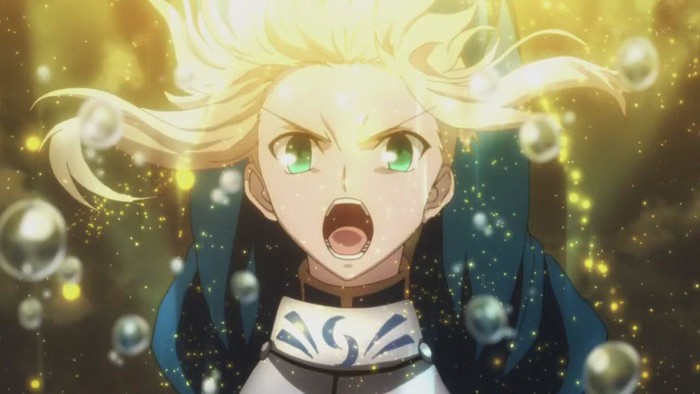
William: If you could adapt any comic or light novel into an anime film or series, what would you choose and why?
Such a hard question! I'll pick Batman.
Jacob: When it comes to action direction, people are very familiar with your heart-pounding style. Do you have a different approach to CG action, like with the mechs for Aldnoah.Zero versus hand-drawn for physical combat like in Fate/Zero? Do you prefer one medium over the other or have different approaches for them?
Regardless of whether you're dealing with CG or hand-drawn, they might be different tools but for choreography direction, they're the same. I don't think I have one that I'm better at. However, when you look at the number of animators that do hand-drawn action in Japan, they are very much overwhelmed by the number of shows being produced, so as a trend, there's an increase in 3D CG action. So I'm pretty sure that there will be more hybrid works that incorporate hand-drawn with CG action, and I'm sure that I'll be part of that movement.
Jacob: With animation fans in the west at least, there's a debate over the decision to cut frames from cel-shaded CG renders to make it look more like anime. Some people say that it looks choppy and aren't comfortable with the blend, preferring fluid motion even at a different framerate from the hand-drawn elements, that it would be less distracting. How do you feel about that debate?
That really does depend on the style of the show, but all the shows that I've worked on are never 100% CG or 100% hand-drawn, and I would like it if there is no disconnect between the tools. So I have in the past dropped framerates for the rendering. That's really to have an integrated sense of wholeness in the animation, but it's not much of a fixation for myself one way or the other.
Jacob: There are certainly two schools of thought on it. There are people who think the end result looks more like anime that way, and those that would prefer CG just always be fluid, so it's interesting to hear creators' personal reasons for cutting frames or not cutting frames.
Jasmine: I'm kind of new when it comes to anime, but I've noticed that the word "zero" pops up in a lot of anime titles. Is there any significance to the word "zero?"
This is a complete fluke. I've worked on three shows with "zero" in the title: Ga-Rei: Zero, Fate/Zero, and Aldnoah.Zero. For Ga-Rei: Zero, it was a prequel to the original work, so in order to get that point across, we put zero in the title. Fate/Zero is the title of the original work by Gen Urobuchi that it's based on, so it's a straight adaptation of that. And for Aldnoah.Zero, it was the producer's idea to put "zero" in the title. Most likely, I won't be working on any more anime that have "zero" in the title.
Jasmine: So this is a hard question, and you can't choose your own anime. What are your top three favorite anime? It could be something you watched as a kid rather than lately if you prefer.
For childhood influence, I don't know if this was ever released in the States, but there was a title called Megazone 23.
Jacob: It was. Sort of a limited release though, didn't really take off here compared to Japan.
I see. I was inspired by Megazone 23 to enter the anime industry, so that's one favorite title. Just one.
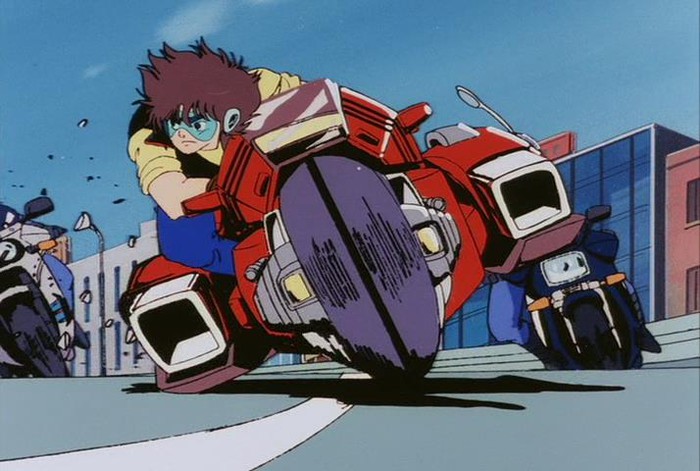
Jasmine: When you work on a project, do you work on only one at a time? Has there ever been a time where you've had to work on two?
Only one title is aired at a time, however, when it comes to pitching and producing titles, there would be several parallel works going on at a time. None of the titles have been announced yet, but I'm working on three anime right now. They're all in different phases, so I'm sure that they won't overlap in the broadcast schedule.
Jasmine: Has there ever been a time when you've worked on one project, gone to work on another project, and then had to go back and work on a sequel or a prequel to the first thing? Is it difficult going back and forth?
I haven't been in that kind of position before, but I'm guessing that it would be a challenge to get back into the style of the original. I would be so preoccupied with my current style that it would be a challenge to go back to the old style and bring back that feeling.
William: What is the production crunch like for an anime film? There are stories of long sleepless nights for anime show runs, but what's it like for a movie production?
For me, my career has mostly been directing TV shows, and my film career has only been with Garden of Sinners. The biggest difference is that for a weekly show, you have a weekly deadline on everything. For a theatrical work, you have just one big deadline. So for a TV show, you need a better-calculated schedule, otherwise you get really crunched up at the end. As a director, you do have to keep the schedule in mind more with television.
Jacob: I wanted to ask about a project that's very different from most of your work, Wandering Son. It's very unique because it explores a community that is not talked about much in Japan or America, the transgender community. How much did you know about transgender people before working on the show, did you research much, and what was the experience of working on that story like overall?
I always loved the original manga by Takako Shimura, so when there was talk that Wandering Son might be animated, the president of the studio I was working with at the time went out and got the rights settled so we could work on it. If you read Shimura's manga, the topic might be about transgender people, but she doesn't actually use the word "transgender" much in the manga itself. She treated the concept much more as characteristic of the specific people in this story. So in order to animate the title, I knew it was a theme of the show, but I didn't want to put the major focus on transgender as an issue, but more as a way to draw out these characters. I didn't really go out and talk to the transgender community to do research for the show.
Jacob: Have you ever met a transgender person before who saw the show and it spoke to them?
Ah, likely not. Not to my recollection.
Jacob: Well, now you have, because I was born female, and I am transgender.
Oh, really! Did you enjoy the show?
Jacob: Yes, very much!
(in English) Thank you!
Jacob: Of course, the "boy who wishes to be a girl" was more the main focus, but I appreciated that there were both perspectives.
(in Japanese) Thank you very much. (in English) Thank you very much.
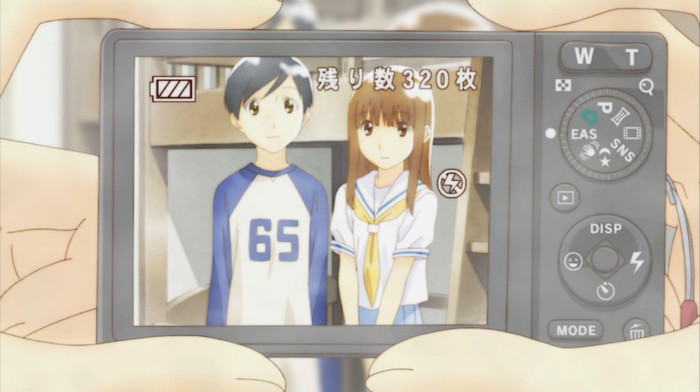
Jasmine: Are you involved in character design or just animation direction?
I've never worked on character design myself, it's all been about directing. I do work out rough images of the characters at the design stage.
Jasmine: So you do have an idea of what you want your characters to look like during the creative process then?
That's true, especially when it comes to original animation projects. The director's notion is very crucial to the show, so those would be the times when I provide sketches.
Jasmine: The reason why I ask is that in the United States, cosplay is becoming quite popular, and it's often joked that some of these anime characters especially are so crazy and abstract that it's hard to recreate them. My best friend cosplayed Saber from Fate/Zero, which was challenging because it was a dress with armor and a prop, and I'm wondering if you have that in mind when these characters are created. Do you guys joke around and say "Let me see if a cosplayer can do this!" Do you see cosplay afterward and are you impressed with the results?
When it comes to Fate/Zero, the designs come from the original illustrator, Takashi Takeuchi, so the character models for the anime are pretty much based on Takeuchi's illustrations. Specifically for Saber's design, it's Takeuchi's design and we didn't have much input to it. I think it was three years ago, when I was at an anime event in LA, there were lots of cosplayers from the show such as Saber and Archer, and I wondered myself how they managed to finish those costumes. They were pretty adept at realizing the designs in cosplay.
William: What are some of the more challenging scenes you've had to direct?
All scenes are pretty difficult! For a TV show, as I mentioned before, the schedule is very tight, so there's a new deadline for everything every week. The biggest challenge is to be in control of the schedule, so production quality will not vary too much between episodes. There are scenes where you have to insist going over schedule in order to perfect them, and then there are other scenes where the schedule takes priority over production value. For me, the biggest challenge is striking the balance between production value and schedule.
Jacob: So Aldnoah.Zero rather infamously ends its first half with a very shocking cliffhanger, and there was a lot of talk at the time amongst fans whether this was always planned, whether this was invented when the announcement of a new cour was cemented, and so on. During the process, did you know that Aldnoah.Zero was going to be two cours, or did you find out during production and decide to end things in such a way? How much did you know about the story at the start of production?
In general, we followed the original story outline as pitched by Gen Urobuchi. However, Urobuchi's outline was not specific enough as to which episode would incorporate which storyline, so the choice for an ending point to the first season was something that we discussed a lot. Since there was a three-month broadcast hiatus between seasons of Aldnoah, we wanted to keep the viewers interested, so we came up with a good way to wrap up the first cour. But a lot of fans did tell us that they were very frustrated and were very curious to know what happened to Inaho. So perhaps there might be a little bit of room to apologize for that.
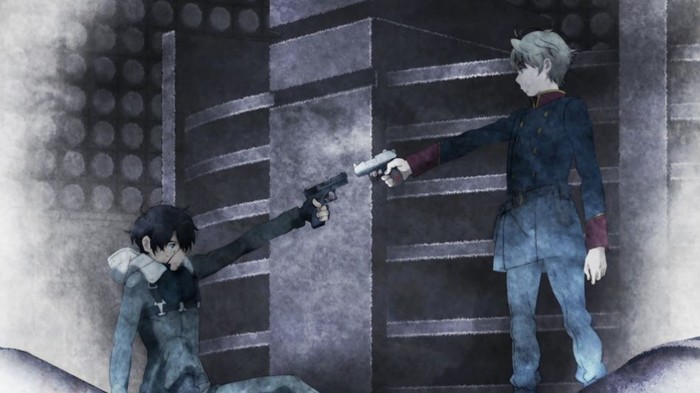
Jacob: Oh no, I was just very curious how much had been figured out in advance, because it was tempting to say "well this was a good place to hard-stop and think on the continuing material," but I have no idea of the production process, of course.
(laughs)
Jacob: So you mentioned Urobuchi, who is very in demand right now, I think. You've worked with Urobuchi and Takako Shimura and Kinoko Nasu, people with very strong voices. Do you ever feel intimidated by that, and what is it like adapting their prose and giving visual life to heavy words?
All three writers do have very strong voices, but if you actually meet them, all three are very nice people! They listen to you a lot, and they love to contribute ideas to the process. Working on their titles was very strenuous work, but as people, they were very good to work with, so there was no personal stress. It's been very rewarding working on their titles.
Jasmine: Is there something for you that would be a dream to work on?
Well, I'm currently 43, and I don't have a single title that would really be the end-all of my career. I want to continue being a director all my life. In order for me to continue to be motivated, each of my works need to cause a reaction in people. For example, I might be invited to an anime convention or event like this because of my work, and I want to be known as someone who would continue to work and have a filmography to talk about.
Jasmine: Is there a manga you've read that you would love to direct?
I would love to adapt another manga by Takako Shimura.
William: Besides the ones you mentioned earlier, are there any other live-action film directors you admire?
Hm, not sure why I'm blanking on so many names today. If I can just namedrop famous people, Spielberg is a favorite. That's because he can vary his style across a broad range that spans a lot of genres. It might be ambitious of me to say that I aspire toward him, but he's certainly a great role model. And Tony Scott, I think we lost him about three years ago, but he's another great director. He had great visuals, so he was a great reference for me. I was very surprised to hear about his passing.
William: Are there any Western animated films that you enjoyed watching?
I'm not sure if it's been released yet, but there was a new show called Voltron, right?
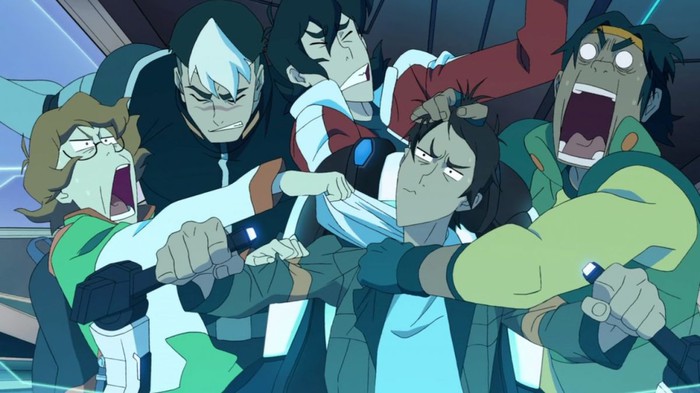
Jacob: Yes, that's a Netflix exclusive here.
I'm really looking forward to catching up on Voltron.
Thanks to Akibafest for facilitating this interview.
discuss this in the forum (7 posts) |